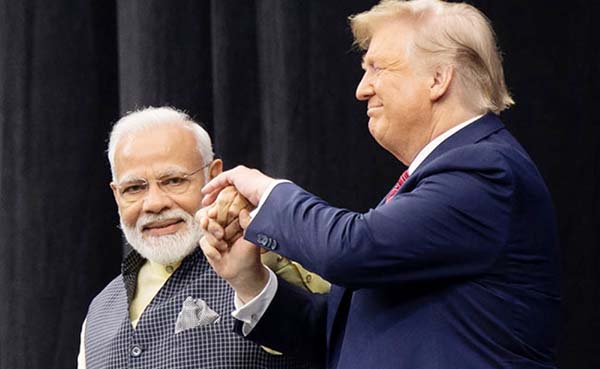
Agencies, New Delhi :
As India rolls out the red carpet to receive US President Donald Trump next week, rough spots that have arisen in the wake of the Modi government’s decisions on Kashmir and the subsequent passing of the Citizenship Amendment Act will need diplomatic resolution. The Modi government’s sudden dilution of the provisions of Article 370 in Kashmir in August 2019, and the move to deny persecuted Muslims from Afghanistan, Bangladesh and Pakistan the right to seek asylum in India, have not only led to protests at home, but also to disruptions in India’s diplomatic ties abroad, especially with the United States. Even though India has relied on global support for its fight against Pakistan-sponsored cross-border terrorism to defend its move on Article 370, Indian diplomats have found themselves playing defense in world capitals, as Pakistan (through China) has used every opportunity and forum to seek international censure against India.
In the last six months, India has firmly rejected two offers by Donald Trump to mediate between India and Pakistan over Kashmir, dismissed as ill-informed and motivated two hearings on Capitol Hill that raised concerns over human rights in the Kashmir valley; now, just days before Trump’s arrival in Delhi, there are bad optics over a letter by four senior Senators to Secretary of State Mike Pompeo seeking an assessment on Kashmir and the Citizenship Amendment Act. At a time of partisan politics and ideological polarisation in both countries, Delhi’s response to hearings and resolutions on Capitol Hill, led largely by legislators from the Democratic Party, was dismissive. However, the fact that one of the signatories to this latest letter includes senior Republican Senator Lindsey Graham (also known to be close to Trump) could indicate that concerns over human rights in India are now becoming bipartisan in a re-election year for Donald Trump.
Meanwhile, two US Congressmen from opposite sides of America’s political divide on Wednesday expressed concern over the Kashmir issue, insisting that the Narendra Modi government release political detainees and restore normalcy in the region at the earliest.
Ami Bera, Democrat Chair of Asia Pacific Group of House Foreign Affairs Committee in the US Congress, and Republican George Holding, who is co-chair of the India caucus, are both visiting India.
Mr Bera told reporters in Delhi that they are keen on bringing a US congressional delegation to Kashmir. “We have expressed our concern on the continued detention of political leaders in Kashmir. We would like to see an early return to normalcy there,” he said in New Delhi.
George Holding expressed a similar sentiment. “A stable political situation in Kashmir is important for its economic development. Increasing economic development in Kashmir is important,” he said.
The comments come days ahead of US President Donald Trump’s visit to India through February 24 and 25, an occasion expected to highlight the bonhomie between the two countries. In the past, Donald Trump had repeatedly offered to mediate between India and Pakistan on Kashmir, which India firmly rejected.
Mr Bera also expressed concern over the Citizenship Amendment Act, a controversial law that has sparked protests across India over the last three months. Several member of the US Congress have already termed the law, which aims to make citizenship easier for non-Muslim migrants from three neighbouring countries, as “discriminatory” and “unconstitutional”.
The politician expressed pride over India’s secular credentials, and hoped they will be preserved in the years to come. “India is a secular democracy where 800 million Hindus live side by side with the minorities,” he said.

